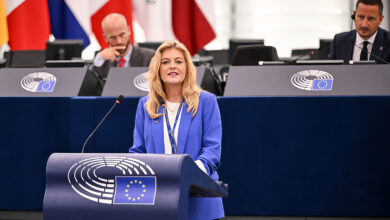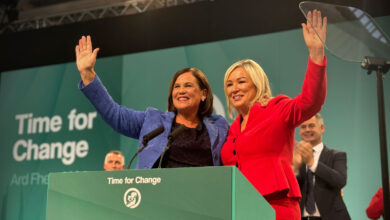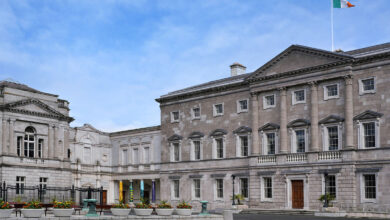Ard fheiseanna
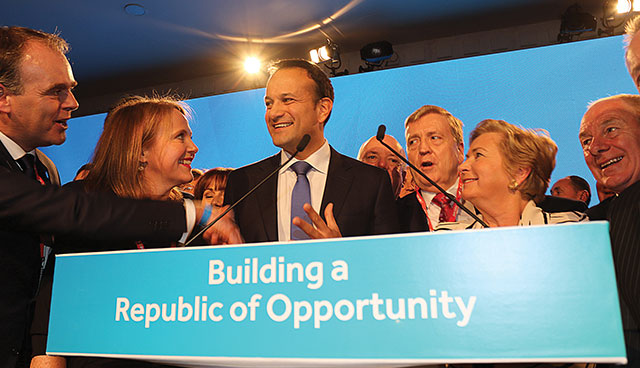

In the aftermath of a quick succession of party ard fheiseanna, eolas reflects on the relative standings of what now constitute ‘the big three’ in Leinster House. As the high tide of the austerity-era rage recedes, and the shifting electoral sands trickle back to Fine Gael and Fianna Fáil, it remains to be seen whether Sinn Féin can viably depose traditional Civil War politics with a new, left/right dichotomy.
Fianna Fáil: An Ireland
for All
Living political life within the confines of a confidence and supply arrangement with the traditional enemy has somewhat stifled the dynamism of the Fianna Fáil party. While a mood of optimism is certainly prevalent, there was a general sense that members are hungry to tear up the uneasy armistice.
In line with leader Micheál Martin’s consistent and increasingly forceful assertions that Fianna Fáil will not enter into coalition with either Sinn Féin under any circumstances, the party overwhelmingly backed a motion proposed by Shane Cassells, TD to that effect. In the process, Cassell’s took a swipe at “the apologists for Sinn Féin in our party”. Martin, meanwhile, repeated his assertion that Fianna Fáil would not enter collation with Fine Gael either, though while he rejected any notion of a confidence and supply agreement with SF, he did not do the same regarding FG.
Simultaneously, the Fianna Fáil leader conceded that his party is unlikely to win an outright majority following the next election. As such, Martin has perhaps significantly limited his party in its post-election options and many Fianna Fáilers will be left wondering whether an election should have been forced at the tail-end of the Kenny-era, prior to Fine Gael’s subsequent Leo-led revitalisation. In the event that Fianna Fáil extracts the most seats from the electorate, it remains to be seen whether Fine Gael will be as accommodating in coming to an arrangement.
Even prior to the 78ú Ard Fheis, Fianna Fáil decided that a whip will not be applied to parliamentary party members on the Eighth Amendment. After a slew of pro-life speeches (22 of a total of 28) at the Ard Fheis, delegates overwhelming endorsed the retention of the Eighth Amendment in a show of hands (a vote which is non-binding on the party leadership), much to the obvious displeasure of some younger, female party members. In the wider referendum campaign, it seems likely the party will refrain from adopting a position.
The party’s cognisance of its past was well acknowledged with a ‘Commemorating 1917’ segment which closed with the Clancy Brothers’ Legion of the Rearguard ringing out across the main hall. This was juxtaposed with Micheál Martin’s entrance, accompanied by a video montage of Fianna Fáil’s ‘greatest hits’ since its last gathering prior to the 2016 general election and punctuated with the lyrics of Imagine Dragons: “Just a young gun with a quick fuse, I was uptight, wanna let loose, I was dreaming of bigger things, And wanna leave my own life behind, Not a yes sir, not a follower.”
Long-regarded as one of Fianna Fáil’s more left-leaning personalities, Martin has taken up the mantle as an advocate for social housing and much of the pointedness in his speech was directed at Fine Gael’s perceived lurch to the right. “We remain determined to fight against the rightward impulses of this Government and the destructive policies of the far left,” he asserted.
Continuing in well-ploughed furrow of criticism channelled towards Varadkar’s ‘Republic of Photo Opportunities’, Martin went on the offensive over the Taoiseach’s “new era of hype and spin”, suggesting that the Government has reached chronic levels of stasis on health, housing and education.
Fianna Fáil’s current position is somewhat opportunistic in that it enables the party to simultaneously take credit for Government policy it regards as positive and to distance itself for that which is perceived as negative. This was evident in Martin’s commentary around budgets 2017 and 2018, in which he has claimed that Fianna Fáil’s influence had succeeded in changing the narrative.
The challenge now for Fianna Fáil is to ensure that Martin can wrest the position of Taoiseach from Varadkar at the first advantageous opportunity following the confidence and supply guarantee to support Budget 2019 (or “spring 2019 at least,” according to Éamon Ó Cuív). Though it remains to be seen what will burst the incumbent’s image-fuelled bubble. Regardless, if the Soldiers of Destiny stumble, it could well be the end of Martin’s stewardship.
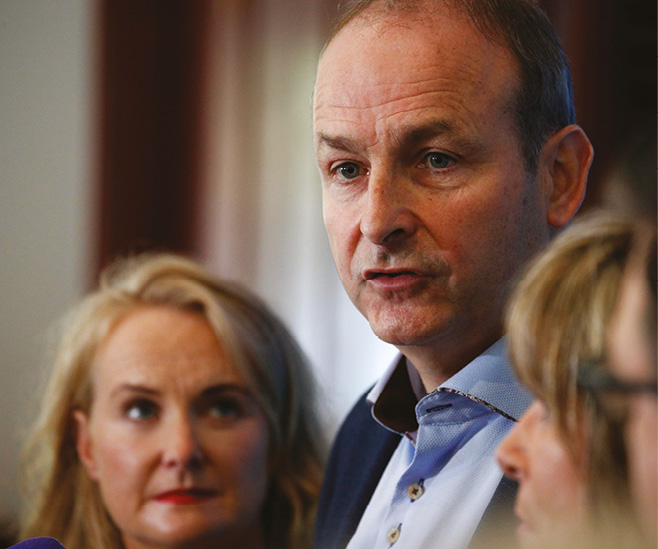
“We remain determined to fight against the rightward impulses of this Government and the destructive policies of the far left.” Micheál Martin
Fine Gael: Building a Republic of Opportunity
Proceedings in the Ballyconnell’s Slieve Russell Hotel on the Cavan/Fermanagh border were somewhat subdued, the reasons being twofold. Firstly, the Taoiseach’s inability to compete for the affections of the nation against Ireland’s World Cup first leg play-off tie with Denmark had caused Fine Gael to reschedule the leader’s speech to the Friday night. Secondly, this was a Fine Gael National Conference, not an ard fheis. As such, while policy matters are debated by members at both events, only an ard fheis incorporates voting on policy motions and rule changes and the election of the Fine Gael Executive Council.
Varadkar’s speech itself was widely scrutinised and interpreted as being lacklustre, and though delegates argued to the contrary, they confided that they never expected him to let loose: ‘He was never going to a do a Ringer’.
Varadkar portrayed Fine Gael as “a party that listens to people” affording a single reference to each Fianna Fáil (“The Agreement with Fianna Fáil is working and the recent budget is testament to that.”), Labour and the Green Party.
The speech was notable in that it was completely devoid of any allusion to Sinn Féin, a conscious decision which did seem anomalous in a homily being delivered to the assembled party faithful who would have eagerly devoured some blistering putdown.
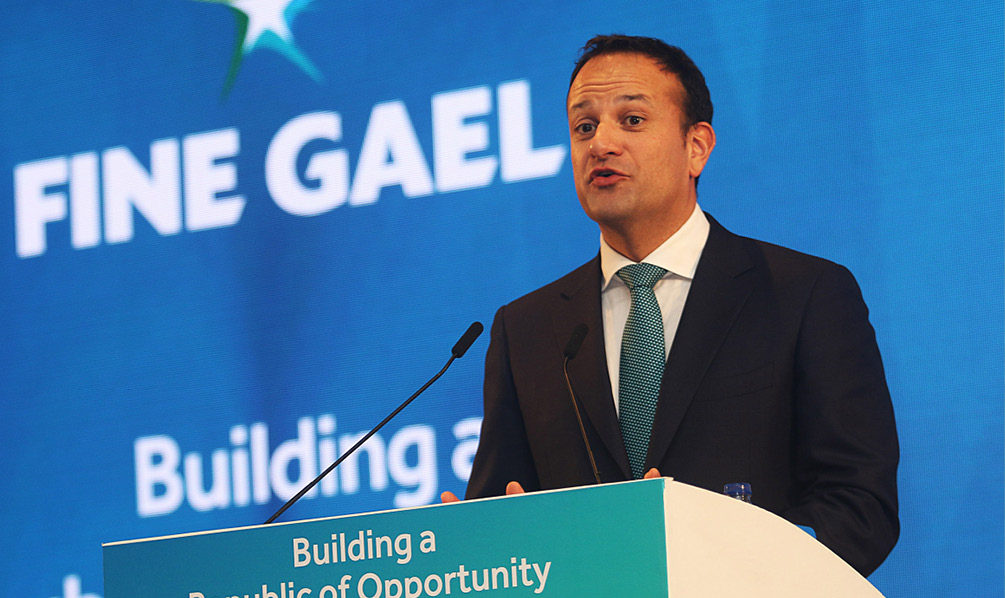
“Ireland has one of the lowest homelessness [rates] by international standards compared with our peers, they’re the stats, we can provide them for you.” Leo Varadkar
Addressing those viewing from home, he announced, “This Government is on your side”. Fine Gael’s intention is to reduce taxes for middle income earners by decreasing income tax in each of the three forthcoming budgets. The party also wants to “make work pay” – a slogan which first reached prominence when adopted by former British Tory Prime Minister David Cameron in 2015.
Another of the weekend’s comments caused much consternation among homeless charities and opposition parties when, during a door-step with journalists, the Taoiseach suggested: “Ireland has one of the lowest homelessness [rates] by international standards compared with our peers, they’re the stats, we can provide them for you.” In subsequent debate the comment was vociferously refuted.
The Eighth Amendment debate revived what was an exceptionally low-key afternoon (many had already begun to drift back to Dublin) and was conducted with a high level of decorum given the divergent opinions exhibited in a series of often highly-charged contributions. Likewise, Catherine Noone was commended for her performance thus far as chair of the Joint Committee on Eighth Amendment of the Constitution.
At the debate’s close, Health minister Simon Harris acknowledged that Irish women are currently having dangerous abortions and that the issue is not going to simply dissipate. He confirmed that Fine Gael will have a conscience vote on both a referendum bill and the referendum.
The challenge now for Fine Gael, is that the Varadkar-leadership adrenalin boost must be transformed into something more sustainable through the delivery of the Building a Republic of Opportunity rolling programme. If he can achieve something of substance, then the manner in which the Taoiseach delivers his orations will fade into complete insignificance in the eyes of his party.
Sinn Féin: Towards a United Ireland
The Sinn Féin Ard Fheis, while similarly coloured by debate around the Eighth Amendment, was almost perfunctory. I bhfábhar. In aghaidh. Tá sé glachtha. Agus arís. Most notably, delegates voted to reaffirm that any decision to enter into a coalition government will be made by a special ard fheis. They also voted resoundingly with the Ard Comhairle’s motion supporting the repeal of the Eighth Amendment and rejected motions advocating a conscience vote on the issue.
The collective and unifying moments of republican history loomed large as is expected and aides-mémoire were scattered across the RDS, from enlarged images of hunger strikers’ ballot papers to a framed photo exhibition dedicated to the late Martin McGuinness. Later in the evening, during a half hour tribute to McGuinness, Derry’s Elisha McCallion elicited a rapturous response when she proclaimed: “Martin was a proud member of the IRA.”
Meanwhile, the real spotlight was squarely focused on the presidential address as assembled columnists hungrily awaited the moment they could add the finishing flourish to their pre-prepared copy.
While he was predictably re-elected as party president, for over a week, rumours were rife that Gerry Adams would make an announcement of historic significance. In the end, these expectations were realised when he announced his stepping aside as Uachtarán Shinn Féin after 34 years. “Republicanism has never been stronger. This is our time. We will grow even stronger in the future. But leadership means knowing when it is time for change. That time is now,” he revealed.
Namechecking a long list of republicans prominent across the decades, before announcing both his and Martin Ferris’ decision to refrain from seeking re-election to the Dáil, the party faithful subsequently burst into a seemingly impromptu rendition of Pádraig Pearse’s Óró, Sé do Bheatha ‘Bhaile. The uniform percussion an allegory perhaps for the characteristic discipline which has come to define the party in recent years.
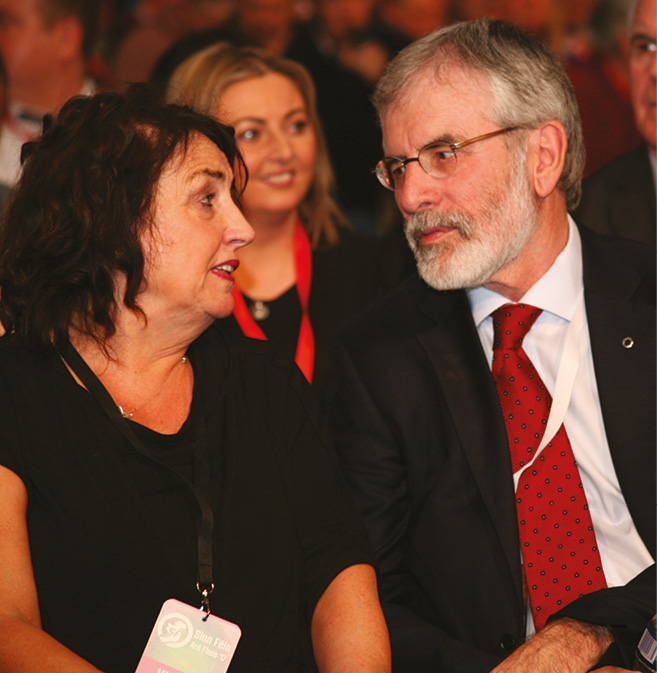
“Republicanism has never been stronger. This is our time. We will grow even stronger in the future. But leadership means knowing when it is time for change. That time is now.” Gerry Adams
It has long been speculated that the passing of the old guard, particularly Adams himself, could unlock a hitherto elusive segment of the floating electorate who could not bring themselves to vote for the party while it remained so firmly wedded to its militant republican origins, as personified by a man who first assumed the presidency in 1983.
Most notably for the party, the northern-axis, around which it has gravitated since the ousting of intractable southern ideologues (Ruairí Ó Brádaigh and Dáithí Ó Conaill) by Adams and allies in the late-1980s, will now tilt firmly southwards (a trajectory it has followed for some years), augmented by the likely emergence of Mary Lou McDonald, who will almost certainly be the party’s first female leader since Margaret Buckley (1937-1950). The only credible challenger, Pearse Doherty, ruling himself out of the contest.
The party’s Ard Comhairle will meet prior to Christmas (within a month of the ard fheis), and while there is no fixed timescale for the election of the next leader, Adams intends to ensure sufficient opportunity for his successor to prepare in advance of the next Dáil election. The party passed a motion to ensure that an extraordinary ard fheis is held within three months after Adams’ departure, in order facilitate a leadership election.
For Sinn Féin, the challenge now is to stubbornly establish itself as the credible centre-life alternative in Irish politics, less encumbered, to some extent, by the weight of history.

